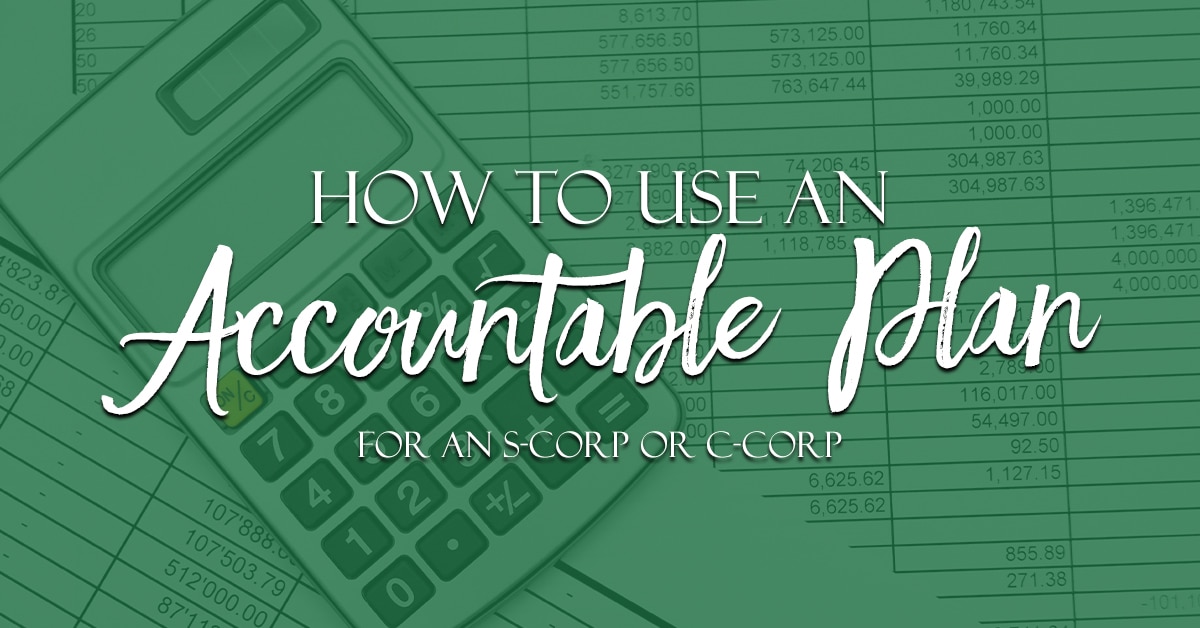How to Use An Accountable Plan For An S-Corp or C-Corp
 In the corporate world, it’s not uncommon for employees to have business-related expenses. With even more workers moving their offices into their homes, these expenses have become even more important. Most companies have formal policies and procedures in place to help account for these costs and plans to help those employees obtain reimbursement. These plans are often referred to as an accountable plan.
In the corporate world, it’s not uncommon for employees to have business-related expenses. With even more workers moving their offices into their homes, these expenses have become even more important. Most companies have formal policies and procedures in place to help account for these costs and plans to help those employees obtain reimbursement. These plans are often referred to as an accountable plan.
What is an Accountable Plan?
Corporate expenses made from employees need certain legal protections for both the company and the employee as well as regulations in regard to tax deductions. An accountable plan is the arrangement between the corporation and the employee for reimbursement of business-related purchases made by the employee. This reimbursement arrangement necessitates employees to substantiate expenses and return unsubstantiated advances.
What types of expenses are covered?
In a corporate office, an employee may have certain needs that arise that are related to their scope of duties. This could include:
- Mileage reimbursement
- Paper
- Desks, Chairs, and other office equipment
- Internet
- Training costs
- Licenses
- Subscriptions
- Business Cards
- Computers
- Food expenses related to business meetings
Each expense accounted for must relate directly to the business and be within the employee’s scope of their required duties for 100% reimbursement. For example, if you were to take a personal trip to the store, the company’s accountable plan would not be able to reimburse you fully and it would expect to be repaid or it would be treated as income for the employee which is also subject to being taxed as such. For mixed expenses, the same expectations would apply. This could include a cell phone, for example, that is used for personal and for business calls.
What are the benefits of an Accountable Plan?
In 2018, the Tax Cuts and Job Act, specifically eliminated itemized deductions and redefined how business expenses and deductions were handled. Out-of-pocket expenses could no longer be used on the employee’s personal tax returns. With the accountable plan, businesses can reimburse employees for these business expenses as long as they are properly claimed, documented, and are then no longer taxable to the recipient.
An Accountable Plan is a wonderful way to pull money out of the corporation and diminishes the overall amount of taxes being paid. By diminishing your total net ordinary business income you are also cutting down one of the criteria for the reasonable salary testing, and this could possibly decrease your salary. This prevents a possible cash drain that could affect the employer as well as the employee.
How can S Corps specifically benefit from an Accountable Plan?
For S corporations, having the accountable plan allows the owner-employees to continue to deduct these business-related expenses by extending it to the business itself. The business will then have the capability to deduct those reimbursed amounts as if they had obtained the expense directly from the corporation itself. This mitigates the tax liability from the employee.
Another benefit for S corporations is the use of their home for business purposes can be reimbursed through an accountable plan. This could include property tax, insurance, home maintenance, mortgage, and even repairs. These expenses, however, are allocated based on the percentage of square footage that is used solely for business-related purposes.
How can C Corps specifically benefit from an Accountable Plan?
For C corporations, some of the same rules and benefits can apply. However, specifically relating to C Corps, there is an exception. In regards to an accountable plan, C corps have a medical reimbursement plan available. This piece of the accountable plan can allow employees to get reimbursed for their medical expenses as long as the company has a medical reimbursement plan already in place in writing. This could include copays and even your medical prescriptions.
Can Partnerships benefit from an Accountable Plan?
With partnerships, the ability to deduct these expenses from an accountable plan can vary when compared to S corps or C Corps. When you are a partner, you generally cannot deduct expenses of the partnership on your personal tax return. This means that the partnership should account for and deduct its own business costs. When using the accountable plan you have in place for your partnership, the reimbursement becomes tax-deductible and reduces the share of the taxable net income. This is especially helpful for partnerships who have at-home office expenses and could use a tax-free reimbursement from their accountable plan.
Summary
An accountable plan is an excellent way for businesses to get more money out of their corporation while helping their employees have a smooth reimbursement process. For S corps and C corps alike, it has been shown to be overtly advantageous in multiple regards. If you are looking to form your own accountable plan, consult with a local CPA near you, who can guide you through the process and the specific IRS regulations in place.






